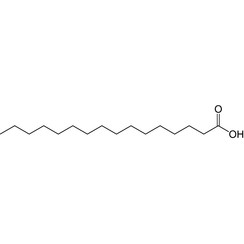You have no items in your shopping cart
Palmitic acid
Palmitic acid, or hexadecanoic acid in IUPAC nomenclature, is the most common saturated fatty acid found in animals, plants and microorganisms. Its chemical formula is CH3(CH2)14COOH, and its C:D is 16:0. As its name indicates, it is a major component of the oil from the fruit of oil palms (palm oil). Palmitic acid can also be found in meats, cheeses, butter, and other dairy products. Palmitates are the salts and esters of palmitic acid. The palmitate anion is the observed form of palmitic acid at physiologic pH (7.4).
Aluminium salts of palmitic acid and naphthenic acid were combined during World War II to produce napalm. The word "napalm" is derived from the words naphthenic acid and palmitic acid.

